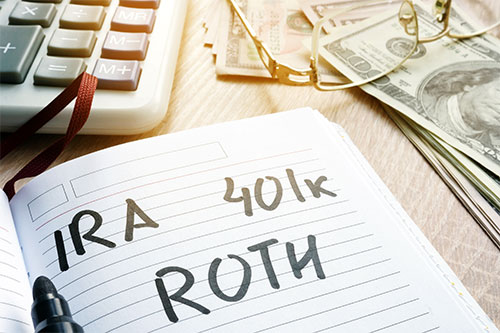Cautions Before Rollover of a 401(k) to an IRA
Your departure from a job or retirement often results in a decision about what to do with your employer sponsored 401(k) retirement account. Many are encouraged to roll the account over into an IRA, Individual Retirement Account. Before making that decision, it is advisable to talk to your tax advisor or accountant, as you have optionsi.
The Basics of 401(k) vs IRA
When consulting IRA financial services companies, they will emphasize that an IRA would offer you many more investment options. This is true, as you can make your own choices of assets for your IRA, even to the point of real estate and precious metals in a self-directed IRA.
The 401(k) will offer more limited choices, as the asset types allowed are selected by the employer. There is a positive side to fewer choices. The employer has a duty to manage the retirement accounts in the best interests of the employee. Lower risk is the approach to protect the account from high risk investment losses. It is the fiduciary duty of the employer and carries legal implications if they do not do a good job.
Another consideration is that management of the IRA usually carries higher costs than the 401(k), reducing the money available at retirement. The employer seeks lower cost management in their and the employees’ best interests.
Fiduciary Duty Matters
There are choices when leaving the company, one being the ability to leave your employer sponsored 401(k) account where it is. Your employer must allow you to leave the account in place if your account has a balance of $5,000 or more. If that option is not available to you, you could roll your plan into a 401(k) with your new employer if they offer one.
Keeping your money in a 401(k) provides extra security for your retirement investment due to the fiduciary duty required of your employer. Most workplace retirement plans are covered by ERISA, the Employee Retirement Income Security Act. It imposes a fiduciary duty on the employer to operate the account solely in the best interests of the employees and avoiding any conflicts of interest.
Because employees have experienced losses due to rollovers into IRAs that were poorly managed or with poor advice, the US Department of Labor is now extending fiduciary coverage to IRA rollovers. If rolling over into an IRA, check whether this fiduciary duty is required of the financial service offering the IRA.
When a Rollover to an IRA Makes Sense
Many people want to make a clean break with a previous employer, taking their retirement accounts with them. It can be the right move if:
- You do not have access to a 401(k) at your new place of employment.
- You want to consolidate more than one retirement account.
- More options for investments are something you want and feel confident in making your selections.
The decision should be made only after consultation with tax advisors/accountants and a thorough evaluation of the financial service offering the IRA and their fees.
i Why a 401(k) Rollover to an IRA Could Be a Mistake – NerdWallet.com

